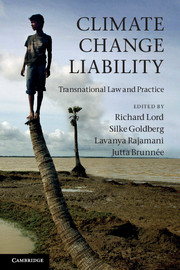Book contents
- Frontmatter
- Contents
- Contributors and Editorial Board members
- Foreword
- Acknowledgements
- Abbreviations
- Part I Legal, scientific and policy aspects
- 1 Introduction
- 2 The scientific basis for climate change liability
- 3 Overview of legal issues relevant to climate change
- 4 Policy considerations
- Part II National laws
- Asia and Pacific
- Africa and the Middle East
- Europe and Eurasia
- North America
- Central and South America
- Selected resources
- Index
- References
2 - The scientific basis for climate change liability
from Part I - Legal, scientific and policy aspects
Published online by Cambridge University Press: 05 June 2012
- Frontmatter
- Contents
- Contributors and Editorial Board members
- Foreword
- Acknowledgements
- Abbreviations
- Part I Legal, scientific and policy aspects
- 1 Introduction
- 2 The scientific basis for climate change liability
- 3 Overview of legal issues relevant to climate change
- 4 Policy considerations
- Part II National laws
- Asia and Pacific
- Africa and the Middle East
- Europe and Eurasia
- North America
- Central and South America
- Selected resources
- Index
- References
Summary
2.01The aim of this chapter is to provide an overview of the science of ‘detection and attribution’ as applied to the global climate system and explain how it relates to events that actually cause harm, such as instances of extreme weather. Detection and attribution are scientific terms for tools for the lawyer’s task of showing the existence, causes and effects of climate change. Lawyers do not always mean the same things as scientists do when using words such as ‘evidence’, ‘proof’ and ‘cause’. Climate change lawyers need not be scientists, but they need to understand the application of science, in terms of its uses and limits. This is likely to be crucial in considerations of liability for climate change, which often entails enquiry into two closely related matters: first, ‘proof’ of causes of climate change itself, in terms of large-scale temperature rise; and second, ‘proof’ of its effects in terms of specific weather events (storms, floods, heatwaves) or localised climate changes (temperature change, precipitation, wind and so on).
2.02The chapter discusses: the relationship between weather and climate; the nature of the evidence for external influence, both natural and anthropogenic, on large-scale average temperatures; the implications of these changes for local extreme weather events; and the kind of evidence that might potentially be available to a court should the issue of causation arise. To avoid the discussion becoming too abstract, I will use as an example a recent study quantifying the role played by increased greenhouse gases (‘GHG’) in the floods that occurred in England and Wales in autumn 2000, but the emphasis is on the basic principles rather than the details of that particular study.
- Type
- Chapter
- Information
- Climate Change LiabilityTransnational Law and Practice, pp. 8 - 22Publisher: Cambridge University PressPrint publication year: 2011
References
- 5
- Cited by



